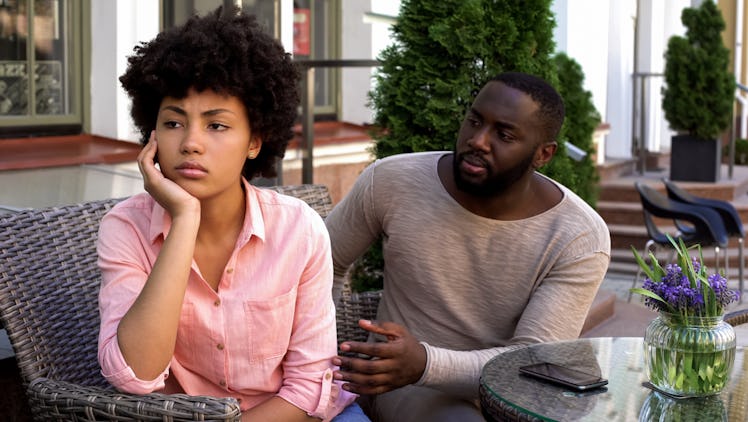
Yes, You Can Save A Relationship With Trust Issues — Here's How
Trust might be the most important pillar of a successful relationship. It’s the thing that allows two people to open up to one another, feeling confident that they can share their most authentic selves without fear of judgment or shame. If you struggle with trust in your relationship, you probably know that it can take a real toll on your happiness. But if you’re willing to make changes, you can save a relationship with trust issues and begin to move forward together.
While there’s no set formula for what constitutes trust issues, you’ll know you’re dealing with them when you feel deeply anxious or concerned about your relationship. Liz Higgins, LMFT and founder of Millennial Life Counseling, says that trust issues show up in the form of suspicion about what your partner is up to. “Typically, when I talk to people who are experiencing trust issues in their relationship, there is a strong feeling of uneasiness as well as anxiety about their partner,” she tells Elite Daily. Even if you haven’t explicitly noticed your partner lying or doing things behind your back, you just have a feeling that something bad is going on. It’s miserable, and it can totally take over your brain space if you don’t take steps to work through it.
But thankfully, relationships with trust issues aren’t always doomed to fail. “Both parties have to be willing to work at it,” explains Nicole Richardson, marriage and family therapist. But if you’re committed to the cause together, you can build up mutual trust that will allay your anxieties and allow you to open up to each other more fully. Here’s how.
1. Identify the breach of trust.
If your trust issues stem from one specific thing that happened — say, infidelity or another secretive misstep — you should try to pin down when the dynamic shifted. “When you can identify where the trust was broken, how this came to happen, and why this is an issue for you, then you can work with your partner to forgive, heal, and establish boundaries going forward to ensure that the same thing doesn't happen again,” Higgins says. Your first step is knowing where things went wrong.
2. Communicate about how you feel.
“Open communication will always be a relationship saver,” Higgins notes. “If you can find the bravery to confront your partner about your feelings and experience in the relationship, there is always a chance to save it.” It’s not easy to express yourself when you feel like you’ve been hurt, but it’s essential that you’re honest about how you feel. Your partner cannot make any changes until they know you are hurting and understand what you need from them.
3. Manage your expectations.
Sometimes, trust issues stem from misaligned expectations each partner holds for the other. “A lot of trust issues in relationships have to do with unmet and unspoken expectations that we may hold about how our partner is supposed to be,” Higgins explains. Do you expect a level of constant communication from your partner that might be unrealistic for them? Or do you feel suspicious of something in their past they haven’t told you about? Whatever it might be, you can’t address it until you talk together about what your needs are.
When you share your concerns with each other, you can often take small steps to alleviate anxiety in your relationship. For instance, setting plans for how and when you’ll communicate throughout the day can keep you from second-guessing every text you send to one another. And sharing details about your past — and what you’ve both learned from your experiences — can help you feel more comfortable moving forward.
4. Do the hard work together.
Sure, you may want to talk to a professional about your individual anxieties at the root of the trust issues. But Higgins says the real work is done when you tackle these pain points together. “Even in counseling, individual work can only go so far,” she explains. “It's when you do the work of processing and working on hardships in your relationship where the true healing occurs.” The two of you might decide to seek couples’ counseling to talk through your concerns with a licensed professional, or you might find that your issues can be solved with a series of real conversations between the two of you. Either way, you need to decide that your relationship is worth saving — and that both of you are willing to put in the work.
It’s important to note that not every relationship is worth holding onto. Sometimes, the healthiest thing you can do is decide to move on from a toxic scenario that causes you pain. But if you believe your trust issues can be solved, and that you’ll be happier as a result, this is always an option. “Staying together after trust issues and doing the hard work of moving forward and forgiving is like strengthening and restructuring the backbone of your relationship,” Higgins explains. “It will actually give you an opportunity and ability to love and respect each other more than before.” If you’re able to move through this challenging situation together, you’ll come out stronger and more resilient as a result.